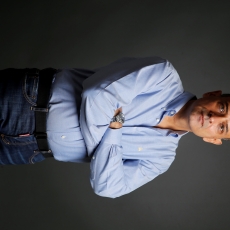Bio
Dr. Demetris Nicolaides holds Diploma in Civil Engineering from the National Technical University of Athens (NTUA), as well as MSc in Structural Engineering from the Cardiff University, UK. From the same school he received his PhD in Civil Engineering in 2004, in the research area of fracture and fatigue of Ultra High-Performance Fiber Reinforced Cementitious Composites (UHPFRCCs). He is currently an Associate Professor of Civil Engineering at Frederick University in Cyprus. He worked as a civil engineering consultant in Greece and Cyprus, being involved in large scale projects.
Dr. Nicolaides’ research focuses in the following fields:
Concrete Technology with particular interest in: (a) the effective reuse of Construction and Demolition Wastes (CDW) and other industrial by-products in concrete mixtures, either as cement or aggregates replacements.
Geopolymer Concretes with particular interest in: (a) the valorization of several waste materials for the development of innovative building materials.
Technology of UHPFRCCs with particular interest in: (a) development, mechanical and durability properties and (b) protection of structures against blast and impact loading.
3D Printing of Cementitious Materials, with particular interest in: (a) optimisation of the rheological characteristics and the interlayer properties of 3D printing concrete.
Projects
BAM - Blast and Fire Resistant Material
30/04/2022 - 30/04/2024
The BAM project aims to develop two novel and smart building materials that will provide effective resistance against impact, blast, and fire.
These materials will be produced using two distinct methods: the traditional precast approach and 3D printing manufacturing.
DEFEAT - Development of an Innovative Insulation Fire Resistant Façade from the Construction and Demolition Waste
01/07/2020 - 01/01/2024
The DEFEAT project aims to create a pilot-scale innovative separation method for Construction and Demolition Waste (CDW) and develop a composite material derived from CDW. This composite material will exhibit low thermal conductivity, satisfactory mechanical properties, and fire-resistant characteristics. This material can be employed as a façade in both new and existing construction projects.
INVALOR101 - A network for joint valorisation of material flows in tourist areas
30/10/2017 - 01/03/2022
Increasing recycling in tourist areas presented a significant challenge due to seasonal peaks and low market values for secondary materials. The Invalor 101 project aimed to establish a network of tourist areas that collaborated on glass waste management. They leveraged academic expertise in Greece, Cyprus, and Albania, along with the Observer Partner (Catholic University of Leuven), to transfer glass upcycling technology and build a Pilot Unit for Municipal partners. This Pilot Unit converted glass waste into building products using geo-polymerization techniques, enhancing recycling. It was a mobile infrastructure shared among network members, designed for easy transfer between partners to manage peak waste during off-season periods, creating jobs and avoiding over-design.
DIAVAL - Valorization of Diabase Mud for the Development of Innovative Building Materials
01/05/2019 - 01/01/2022
The primary goal of the DIAVAL project was to convert diabase mud from waste material into a secondary raw material for creating innovative binders and, consequently, marketable precast building materials. To achieve this, the project aimed to establish a pilot production line for the manufacture of advanced building materials using waste diabase mud, employing the innovative geopolymerization technology. This technology involves blending an aluminosilicate raw material with an alkaline activator to produce materials with properties akin to those of cement-based products.
RAPCON - Recycled Aggregates for the Production of Concrete
01/05/2019 - 01/01/2022
The RAPCON project had the goal of transforming a typically discarded material, recycled concrete aggregates (RCA), into a valuable product known as recycled aggregate concrete (RAC). The research concentrated on improving the mechanical and durability characteristics of RAC. The successful incorporation of RCA into production processes advanced the understanding of reusing waste materials in the construction industry, promoting recycling in Cyprus and offering potential economic, technical, and environmental benefits.
IMPACT - Mix Design, Mechanical Properties and Impact Resistance of UHPFRCCs
01/10/2013 - 01/10/2015
Ultra High Performance Fiber Reinforced Cementitious Composites (UHPFRCCs) demonstrate exceptional material properties and enhanced mechanical behavior compared to traditional concrete. Due to their higher cost compared to conventional and even High Performance Concrete, it was essential to identify applications that could fully leverage their enhanced properties. The research aimed to establish production guidelines for UHPFRCC and experimentally analyze its quality and performance in highly demanding applications, particularly in impact and explosion resistance for structures. The research team addressed critical issues necessary for the widespread use of UHPFRCC in applications such as defense structures, security enclosures, and containment vessels for toxic and nuclear waste, both in Cyprus and internationally.
